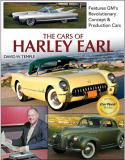Úvod »Motocykly»Tatran » Virgil Exner - Visioneer: The official biography of Virgil M. Exner, designer ex
Anotace
| Vazba: | Brožovaná | ||
| Počet stran: | 176 | ||
| Rozměry v mm: | 210 x 260 | ||
| Počet obrázků: | 388 | ||
| Rok vydání: | 2015 | ||
| Vydání: | 2. | ||
Features
• First book ever written about the subject.
• Covers his whole life, from birth to death
• Offers unseen family photos and paintings.
• Covers the history of industrial design and development of automobile & powerboat styling.
• Clarifies rumours and speculation on historic events.
• Shows rarely seen pictures and period adverts.
• Written in plain unpretentious English, and easy to follow.
• Extended captions with the images.
• Foreword by Virgil M. Exner Jnr.
Description
An in-depth look at the last of the great auto designers of the 20th Century, his glorious achievements and personal tragedies. With many previously unseen works of art and family photos among the 150 colour images throughout, this is a unique and fascinating insight into a pivotal player in the development of the modern automobile.
Synopsis
The story of a man that brought his own personal style to the world of industrial design, from automobiles to powerboats. Some 50 years after his design masterpieces wrested styling leadership away from General Motors - Harley Earl. Thirty four years after his untimely death, Virgil Exner’s name still remains inexorably linked to the Chrysler Corporation in the minds of car enthusiasts worldwide. For an all too brief period, Exner’s name epitomised all that was great and exciting in America. His thrilling automobile designs from the mid-fifties took the world by storm and put Chrysler at the top. His work was nothing less than a revolution. Until the mid-fifties, engineers, creating cars that were reliable but invariably staid and conservative, had dominated auto design. Exner introduced to Chrysler, firstly with his ‘idea cars’ then with production models, vehicles that were wanted for their looks but at the same time, were soundly engineered; automobiles that carried classic proportions and gave the illusion of movement even whilst stationary. His design of the 1947 Studebaker established the design pattern for all modern cars and was a huge success. Along with automobile styling, his talents stretched to many other areas of industrial design, from trains to trucks and boats to Buicks. This book gets behind the character of the man, his strengths and weaknesses, his personal tragedies and his vision of modern transport. Uncover why he set up in competition with Raymond Loewy, get the real facts behind historic inaccuracies and why he was made scapegoat for the sales disaster of the early sixties, Then delight in his fine artwork and his love of motor racing. With many previously unseen works of art and family photos among the 150 colour images throughout this is a unique and fascinating insight into a pivotal player in the development of the modern automobile.
Includes coverage of 1920 Duesenberg Model-A, 1930-33 Studebaker, 1932 Studebaker Indy racing car, 1936-39 Pontiac, 1939 Buick, 1939 International Truck, 1939-50 Studebaker, 1942 Weasel, 1943 DUKW, 1948 Tasco, 1950-63 Chrysler, Dodge, DeSoto, Imperial & Plymouth. 1950-51 Cunningham, 1960 VW Karmann Ghia, 1965-68 Buehler Turbocraft boat, 1964 Bugatti, 1965 Duesenberg, Stutz, Mercer & Packard Revival cars. 1967 Riva powerboats, 1966-69 Karmann Ghia & Porsche, 1967 Matthews cruiser, 1967 Bristol Yacht, 1967 Pacemaker powerboats, 1970 Norig powerboat, 1973 Oldsmobile.





















